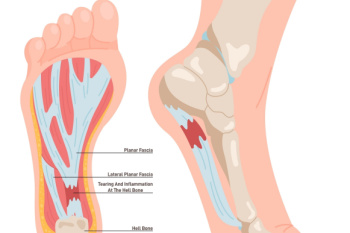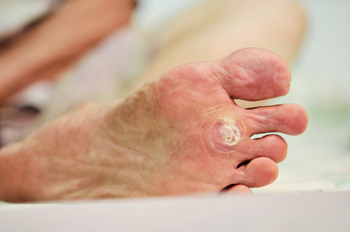Items filtered by date: March 2025
Understanding Plantar Fasciitis

Plantar fasciitis causes pain and inflammation in the thick band of tissue running along the bottom of the foot. This tissue, known as the plantar fascia, connects the heel to the toes and helps support the arch. Repetitive strain or excessive pressure can cause small tears in the fascia, leading to irritation and discomfort. The pain is often felt near the heel and is typically worse in the morning or after long periods of rest. Risk factors include prolonged standing, high-impact activities, improper footwear, and foot structure abnormalities like flat feet or high arches. Plantar fasciitis can cause severe pain and discomfort, and it may become difficult to complete daily activities. If you have heel pain, it is strongly suggested that you promptly consult a podiatrist who can accurately diagnose and treat this condition.
Plantar fasciitis can be very painful and inconvenient. If you are experiencing heel pain or symptoms of plantar fasciitis, contact One of our podiatrists from Foot and Ankle Medical Center. Our doctors can provide the care you need to keep you pain-free and on your feet.
What Is Plantar Fasciitis?
Plantar fasciitis is the inflammation of the thick band of tissue that runs along the bottom of your foot, known as the plantar fascia, and causes mild to severe heel pain.
What Causes Plantar Fasciitis?
- Excessive running
- Non-supportive shoes
- Overpronation
- Repeated stretching and tearing of the plantar fascia
How Can It Be Treated?
- Conservative measures – anti-inflammatories, ice packs, stretching exercises, physical therapy, orthotic devices
- Shockwave therapy – sound waves are sent to the affected area to facilitate healing and are usually used for chronic cases of plantar fasciitis
- Surgery – usually only used as a last resort when all else fails. The plantar fascia can be surgically detached from the heel
While very treatable, plantar fasciitis is definitely not something that should be ignored. Especially in severe cases, speaking to your doctor right away is highly recommended to avoid complications and severe heel pain. Your podiatrist can work with you to provide the appropriate treatment options tailored to your condition.
If you have any questions please feel free to contact our offices located in New Port Richey and Spring Hill, FL . We offer the newest diagnostic and treatment technologies for all your foot and ankle needs.
Common Locations and Causes of Plantar Warts

Plantar warts are small, rough growths that develop on the soles of the feet due to a viral infection. They are caused by the human papillomavirus, or HPV, which enters the skin through tiny cuts or abrasions. These warts often appear on weight-bearing areas, such as the heels or the balls of the feet, where pressure can cause them to grow inward, creating discomfort or pain while walking. The virus thrives in warm, moist environments, making public showers, around swimming pools, and locker rooms common places for exposure. People with weakened immune systems or frequent barefoot exposure to contaminated surfaces are at higher risk. Plantar warts can cause significant discomfort, and it may be difficult to complete daily activities. If you have developed this condition, it is suggested that you consult a podiatrist who can offer effective treatment solutions.
Plantar warts can be very uncomfortable. If you need your feet checked, contact One of our podiatrists from Foot and Ankle Medical Center. Our doctors will assist you with all of your foot and ankle needs.
About Plantar Warts
Plantar warts are the result of HPV, or human papillomavirus, getting into open wounds on the feet. They are mostly found on the heels or balls of the feet.
While plantar warts are generally harmless, those experiencing excessive pain or those suffering from diabetes or a compromised immune system require immediate medical care. Plantar warts are easily diagnosed, usually through scraping off a bit of rough skin or by getting a biopsy.
Symptoms
- Lesions on the bottom of your feet, usually rough and grainy
- Hard or thick callused spots
- Wart seeds, which are small clotted blood vessels that look like little black spots
- Pain, discomfort, or tenderness of your feet when walking or standing
Treatment
- Freezing
- Electric tool removal
- Laser Treatment
- Topical Creams (prescription only)
- Over-the-counter medications
To help prevent developing plantar warts, avoid walking barefoot over abrasive surfaces that can cause cuts or wounds for HPV to get into. Avoiding direct contact with other warts, as well as not picking or rubbing existing warts, can help prevent the further spread of plantar warts. However, if you think you have developed plantar warts, speak to your podiatrist. He or she can diagnose the warts on your feet and recommend the appropriate treatment options.
If you have any questions please feel free to contact our offices located in New Port Richey and Spring Hill, FL . We offer the newest diagnostic and treatment technologies for all your foot and ankle needs.
Diabetic Foot Ulcers Is a Condition You Cannot Ignore

Nearly one in three people with diabetes will develop a diabetic foot ulcer, a slow-healing wound that can turn serious fast. These ulcers often start small, maybe like a blister or callus, but with poor circulation and nerve damage, they can quickly worsen without pain as a warning sign. Left untreated, infections can spread, sometimes leading to hospitalization or even limb loss. Prevention is key. Daily foot checks, wearing proper footwear, and keeping blood sugar in check reduce risks. But if you have diabetes and you notice redness, swelling, or a wound that is not healing, it is strongly suggested that you see a podiatrist for care as quickly as possible.
Wound care is an important part in dealing with diabetes. If you have diabetes and a foot wound or would like more information about wound care for diabetics, consult with One of our podiatrists from Foot and Ankle Medical Center. Our doctors will assess your condition and provide you with quality foot and ankle treatment.
What Is Wound Care?
Wound care is the practice of taking proper care of a wound. This can range from the smallest to the largest of wounds. While everyone can benefit from proper wound care, it is much more important for diabetics. Diabetics often suffer from poor blood circulation which causes wounds to heal much slower than they would in a non-diabetic.
What Is the Importance of Wound Care?
While it may not seem apparent with small ulcers on the foot, for diabetics, any size ulcer can become infected. Diabetics often also suffer from neuropathy, or nerve loss. This means they might not even feel when they have an ulcer on their foot. If the wound becomes severely infected, amputation may be necessary. Therefore, it is of the upmost importance to properly care for any and all foot wounds.
How to Care for Wounds
The best way to care for foot wounds is to prevent them. For diabetics, this means daily inspections of the feet for any signs of abnormalities or ulcers. It is also recommended to see a podiatrist several times a year for a foot inspection. If you do have an ulcer, run the wound under water to clear dirt from the wound; then apply antibiotic ointment to the wound and cover with a bandage. Bandages should be changed daily and keeping pressure off the wound is smart. It is advised to see a podiatrist, who can keep an eye on it.
If you have any questions, please feel free to contact our offices located in New Port Richey and Spring Hill, FL . We offer the newest diagnostic and treatment technologies for all your foot care needs.
Stop Your Toenail Fungus
Signs of Diabetic Peripheral Neuropathy

Diabetic peripheral neuropathy is a condition caused by prolonged high blood sugar levels that damage the nerves, especially those in the feet, toes, and ankles. Many people first notice numbness, tingling, or burning sensations, which can become more intense at night. Some patients may feel sudden, sharp pains or an electric shock-like sensation in their feet. As diabetic peripheral neuropathy progresses, loss of balance and coordination may also occur due to weakened ankle muscles and decreased sensation. This can lead to an unstable gait that increases the risk of falls. Changes in foot structure, such as hammertoes, may develop as nerve damage affects muscle function. One significant concern is the inability to feel cuts, blisters, or pressure points, which can result in unnoticed wounds that may become infected. A podiatrist can evaluate nerve function, provide foot care strategies, and recommend treatment to help prevent complications like foot ulcers and deformities. If your feet and toes feel numb, it is suggested that you schedule an appointment with a podiatrist to find out if peripheral neuropathy is causing the problem.
Neuropathy
Neuropathy can be a potentially serious condition, especially if it is left undiagnosed. If you have any concerns that you may be experiencing nerve loss in your feet, consult with One of our podiatrists from Foot and Ankle Medical Center. Our doctors will assess your condition and provide you with quality foot and ankle treatment for neuropathy.
What Is Neuropathy?
Neuropathy is a condition that leads to damage to the nerves in the body. Peripheral neuropathy, or neuropathy that affects your peripheral nervous system, usually occurs in the feet. Neuropathy can be triggered by a number of different causes. Such causes include diabetes, infections, cancers, disorders, and toxic substances.
Symptoms of Neuropathy Include:
- Numbness
- Sensation loss
- Prickling and tingling sensations
- Throbbing, freezing, burning pains
- Muscle weakness
Those with diabetes are at serious risk due to being unable to feel an ulcer on their feet. Diabetics usually also suffer from poor blood circulation. This can lead to the wound not healing, infections occurring, and the limb may have to be amputated.
Treatment
To treat neuropathy in the foot, podiatrists will first diagnose the cause of the neuropathy. Figuring out the underlying cause of the neuropathy will allow the podiatrist to prescribe the best treatment, whether it be caused by diabetes, toxic substance exposure, infection, etc. If the nerve has not died, then it’s possible that sensation may be able to return to the foot.
Pain medication may be issued for pain. Electrical nerve stimulation can be used to stimulate nerves. If the neuropathy is caused from pressure on the nerves, then surgery may be necessary.
If you have any questions, please feel free to contact our offices located in New Port Richey and Spring Hill, FL . We offer the newest diagnostic and treatment technologies for all your foot care needs.

